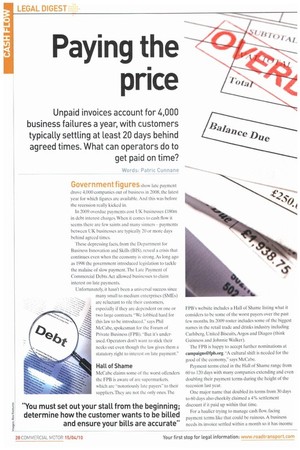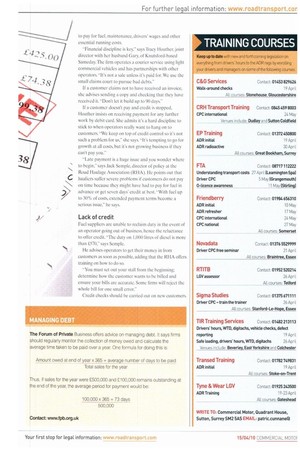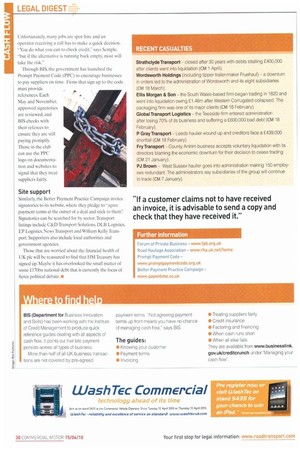Paying the price
Page 28

Page 29

Page 30

If you've noticed an error in this article please click here to report it so we can fix it.
Unpaid invoices account for 4,000 business failures a year, with customers typically settling at least 20 days behind agreed times. What can operators do to get paid on time?
Words: Patric Cunnane Government figures show late payment drove 4,000 companies out of business in 2008, the latest year for which figures are available. And this was before the recession really kicked in.
In 2009 overdue payments cost UK businesses £180m in debt interest charges. When it comes to cash flow it seems there are few saints and many sinners — payments between UK businesses are typically 20 or more days behind agreed times.
These depressing facts, from the Department for Business Innovation and Skills (BIS), reveal a crisis that continues even when the economy is strong. As long ago as 1998 the government introduced legislation to tackle the malaise of slow payment. The Late Payment of Commercial Debts Act allowed businesses to claim interest on late payments.
Unfortunately, it hasn't been a universal success since many small to medium enterprises (SMEs) are reluctant to rile their customers, especially if they are dependent on one or two large contracts. "We lobbied hard for this law to he introduced," says Phil McCabe, spokesman for the Forum of Private Business (FPB). "But it's underused. Operators don't want to stick their necks out even though the law gives them a statutory right to interest on late payment."
Hall of Shame McCabe claims some of the worst offenders the FPB is aware of are supermarkets, which are -*notoriously late payers" to their suppliers. They are not the only ones. The
FPB's website includes a Hall of Shame listing what it considers to be some of the worst payers over the past few months. Its 2009 roster includes some of the biggest names in the retail trade and drinks industry including Carlsberg, United Biscuits, Argos and Diageo (think Guinness and Johnnie Walker).
The FPB is happy to accept further nominations at campaigns@fpltorg."A cultural shift is needed for the good of the economy," says McCabe.
Payment terms cited in the Hall of Shame range from 60 to 120 days with many companies extending and even doubling their payment terms during the height of the recession last year.
One major name that doubled its terms from 30 days to 60 days also cheekily claimed a 4% settlement discount if it paid up within that time.
For a haulier trying to manage cash flow, facing payment terms like that could be ruinous. A business needs its invoice settled within a month so it has income
to pay for fuel, maintenance, drivers' wages and other essential running costs.
-Financial discipline is key," says Tracy Hoather. joint director with her husband Gary, of Knutsford-hosed Sameday.The firm operates a courier service using light commercial vehicles and has partnerships with other operators. -It's not a sale unless it's paid for. We use the small claims court to pursue had debts," If a customer claims not to have received an invoice. she advises sending a copy and checking that they have received it. "Don't let it build up to 90 days."
If a customer doesn't pay and credit is stopped, Hoather insists on receiving payment for any further work by debit card. She admits it's a hard discipline to stick to when operators really want to hang on to customers. "We keep on top of credit control so it's not such a problem for us," she says. "It's tempting to go for growth at all costs, but it's not growing business if they can't pay you."
"Late payment is a huge issue and you wonder where to begin," says Jack Semple, director of policy at the Road Haulage Association (RHA). He points out that hauliers suffer severe problems if customers do not pay „IN on time because they might have had to pay for fuel in advance or get seven days' credit at best. "With fuel up to 30% of costs, extended payment terms become a serious issue." he says.
Lack of credit Fuel suppliers are unable to reclaim duty in the event of an operator going out of business, hence the reluctance to offer credit."The duty on 1.000 litres of diesel is more than £570," says Semple. 'St He advises operators to get their money in from customers as soon as possible, adding that the Rf IA offers training on how to do so.
You must set out your stall from the beginning; determine how the customer wants to he billed and ensure your bills are accurate. Some firms will reject the whole bill for one small error."
Credit checks should be carried out on new customers, Unfortunately, many jobs are spot-hire and an operator receiving a call has to make a quick decision. "You do what you can to check credit.says Semple. "but if the alternative is running hack empty, most will take the risk."
Through BIS, the government has launched the Prompt Payment Code (PPC) to encourage businesses to pay suppliers on time. Firms that sign up to the code must provide references. Each May and November. approved signatories are reviewed, and HIS checks with their referees to ensure they arc still paying promptly. Those in the club can use the PPC logo on documentation and wehsites to signal that they treat suppliers fairly.
Site support Similarly, the Better Payment Practice Campaign invites signatories to its vvebsite, where they pledge to "agree payment terms at the outset of a deal and stick to them': Signatories can be searched for by sector. Transport listings include C&D Transport Solutions, DLB Logistics. EP Logistics. News Transport and William Kelly Transport. Supporters also include local authorities and government agencies.
Those that are worried about the financial health of UK plc will be reassured to find that UM Treasury has signed up. Maybe it has overlooked the small matter of some I:170bn national debt that is currently the focus of fierce political debate. a
































































































































